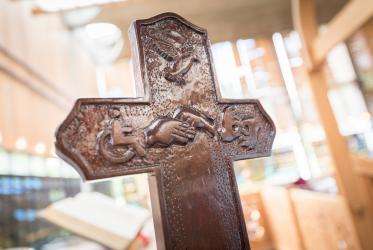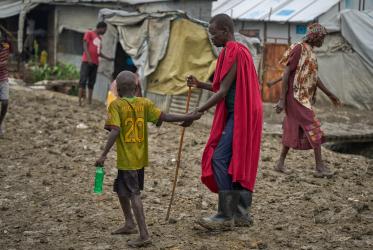The “Exclusion and Embrace Conference: Disability, Justice and Spirituality” was held in Melbourne, Australia 20-24 August. The multi-faith conference explored the issues of faith and meaning in the lived experience of disability. Participants discussed ethics, care, inclusion in faith communities, friendship, discrimination, love, justice and liberation. Dr Samuel Kabue, executive secretary of the World Council of Churches Ecumenical Disability Advocates Network (EDAN), gave a presentation entitled “Disability/Theology in curriculum of Theological Institutions.”
Addressing the subject of theological education and disability, he said: “There is no doubt that the most suitable foundation through which the churches could best be engaged in disability discourse is the introduction of disability studies in theological institutions.”
It is the only way, he said, to ensure that women and men who are trained to work in churches, lay training centres, and theological and ecumenical institutions are well-prepared and equipped to address the pastoral, theological and ethical concerns that are voiced by people with disabilities.
Prof. Hans Reinders of Vrije Universiteit in Amsterdam joined Kabue in leading discussion of the World Council of Churches (WCC) policy document “The Gift of Being,” which was being presented in an international forum for the first time since its adoption by WCC Central Committee in June.
Highlighting the central message, Kabue told the gathering: “We as a church are incomplete without one another; we are less than whole. Including persons with disabilities is therefore not an option for the church. It is the church’s defining characteristic.”
At the end of the conference, participants agreed to form an Interfaith Disability Network in Australia-Asia, and form a network of theological institutions.
Another highlight of the conference was a presentation, “Igniting the Fire: Disabled People creating church,” given by a team led by Vicki Terrell, EDAN representative from Aotearoa New Zealand. Terell is an Anglican priest and has cerebral palsy.
Terrell has initiated a Disability Faith Community in Auckland which does not replace church but is a non-denominational home group-style meeting during which participants read scripture together, pray, worship and have fellowship.
The community is celebrating its first birthday this month. Anna Nelson, who helped Terrell establish the group, said Disability Faith Community brings people together to explore faith from a biblical point of view and educate churches on disability. “Persons with disabilities have valued the uniqueness of the community and the presence of God in our meetings,” she said.
Terrell is also currently the chairperson of the Disability, Spirituality and Faith Network of Aotearoa New Zealand that will host the next Disability, Faith and Spirituality Conference in Auckland in two years.
Ecumenical Disability Advocates Network (EDAN)
WCC Central Committee document: The Gift of Being
Gathering promotes disability-inclusive development in East Africa (WCC press release of 11 August 2016)
To be human is to be vulnerable… (WCC press release of 14 July 2016)







